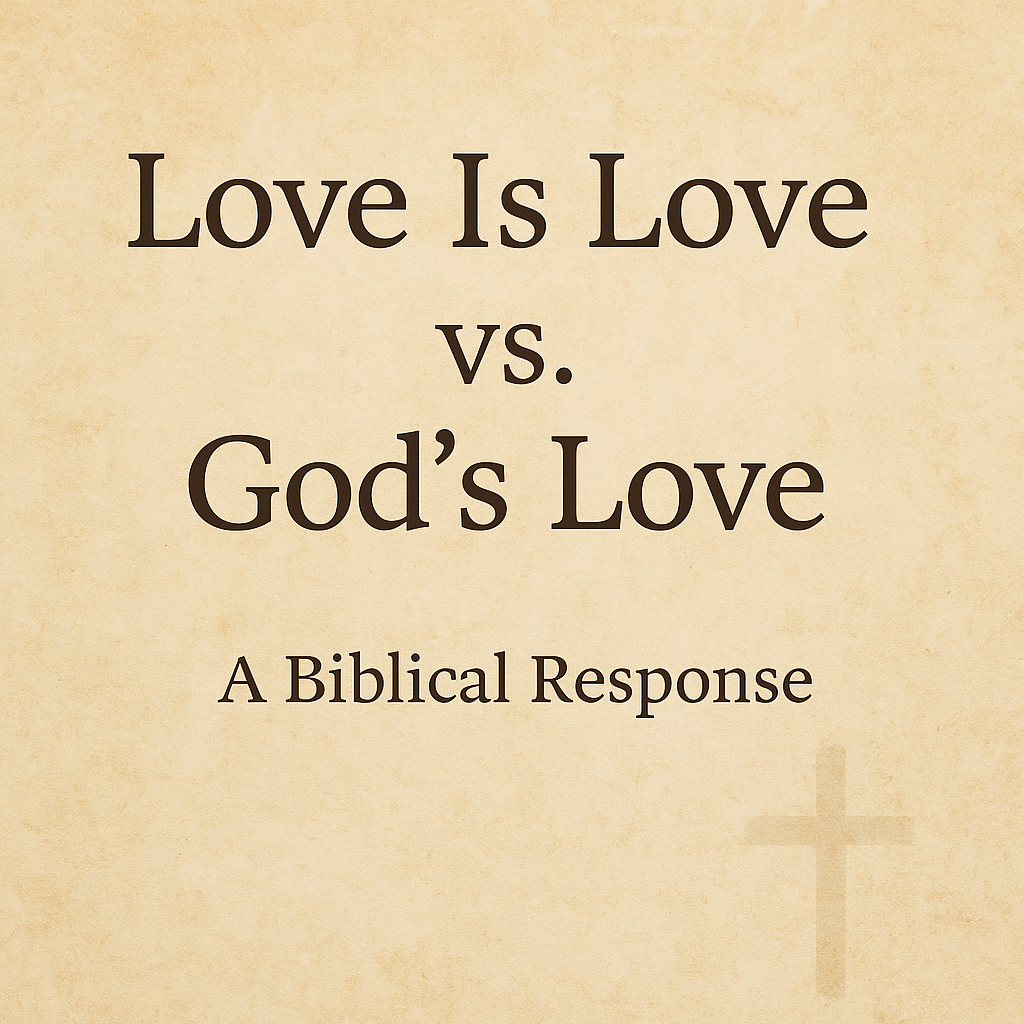⏱️ Estimated Reading Time: 4 min read
Love Is Love vs. God’s Love: A Biblical Response
By Dave Jenkins
In recent years, the phrase “Love is love” has become a rallying cry in popular culture. While it sounds compassionate and inclusive, Christians need to ask what it really means—and whether it aligns with the truth of God’s Word.
💡 Why “Love Is Love” Fails the Test of Truth
The phrase “Love is love” has become one of the most powerful slogans of our time. It’s plastered on t-shirts, social media bios, political signs, and even church banners. It sounds harmless—affirming, inclusive, even biblical in tone.
But beneath its simplicity lies a dangerous redefinition.
“Love is love” isn’t just a feel-good phrase—it’s a worldview, one that detaches love from truth, separates love from God, and replaces biblical categories with subjective emotions.
1. It Makes Love Self-Defining
By repeating “love is love,” the phrase assumes that love can define itself. But biblically, love does not originate in human emotion or experience—it originates in God Himself.
“God is love.” —1 John 4:8
God defines love—not culture, not desire, not attraction. To say “love is love” without grounding it in who God is and what God says is to cut the heart out of real love.
2. It Justifies Sin
The phrase is often used to validate relationships or actions the Bible clearly calls sin—especially in the context of homosexuality, gender ideology, or premarital sexual relationships.
“Love does not rejoice at wrongdoing, but rejoices with the truth.” —1 Corinthians 13:6
Love never celebrates sin. Love doesn’t affirm what God calls destructive. If a relationship is built on rebellion against God, it’s not loving—it’s damaging.
3. It Separates Love from Holiness
True love is not indulgent or permissive—it is holy.
“Let love be genuine. Abhor what is evil; hold fast to what is good.” —Romans 12:9
You cannot love someone rightly while approving what leads them away from God. “Love is love” refuses to make moral distinctions—but biblical love always discerns, corrects, and calls to repentance.
4. It Distorts the Gospel
The most unloving thing we can do is to affirm people in their sin rather than point them to the grace and truth of Jesus.
Jesus didn’t say, “Come as you are and stay as you are.” He said: “Go, and sin no more.” —John 8:11
The gospel is not about affirming all our desires but about rescuing us from sin through Christ’s death and resurrection. Jesus welcomes us as we are but never leaves us there—He transforms us by grace and truth.
❤️ What Is Real Love?
Real love is rooted in truth. It’s not passive acceptance but active self-giving for another’s eternal good.
“In this is love, not that we have loved God but that He loved us and sent His Son…” —1 John 4:10
As 2 John 1:6 says, “And this is love, that we walk according to His commandments.” Real love is inseparable from obedience to God.
God’s love is holy, sacrificial, and always aligned with His truth. He doesn’t excuse sin—He sent His Son to bear its penalty. That’s real love.
How Should Christians Respond?
- Reject the slogan, embrace the Savior.
- Speak truth with tenderness—but never abandon truth.
- Clarify that true love is rooted in God’s Word—not human desire.
- Proclaim the gospel as the ultimate act of love.
Some may say rejecting “love is love” is unkind or bigoted. But biblical love is never unkind—it is the most compassionate truth because it points us to eternal life in Christ.
- Love without truth is sentimentality.
- Truth without love is harshness.
- But truth with love is the gospel.
Reflection Questions
- Where have you seen this phrase shape how people think about love?
- Are there areas in your own life where you’ve accepted cultural definitions of love?
- How can you show both truth and grace in conversations about love?
📚 For Further Study
- The Word Matters by Dave Jenkins
- Holy Sexuality and the Gospel by Christopher Yuan
- The Dangers of “Self-Love” and Scripture’s Teaching on Biblical Love with Dave and Sarah Jenkins
Dave Jenkins is happily married to his wife, Sarah. He is a writer, editor, and speaker living in beautiful Southern Oregon. Dave is a lover of Christ, His people, the Church, and sound theology. He serves as the Executive Director of Servants of Grace Ministries, the Executive Editor of Theology for Life Magazine, the Host and Producer of Equipping You in Grace Podcast, and is a contributor to and producer of Contending for the Word. He is the author of The Word Explored: The Problem of Biblical Illiteracy and What To Do About It (House to House, 2021), The Word Matters: Defending Biblical Authority Against the Spirit of the Age (G3 Press, 2022), and Contentment: The Journey of a Lifetime (Theology for Life, 2024). You can find him on Facebook, Twitter, Instagram, Youtube, or read his newsletter. Dave loves to spend time with his wife, going to movies, eating at a nice restaurant, or going out for a round of golf with a good friend. He is also a voracious reader, in particular of Reformed theology, and the Puritans. You will often find him when he’s not busy with ministry reading a pile of the latest books from a wide variety of Christian publishers. Dave received his M.A.R. and M.Div through Liberty Baptist Theological Seminary.




